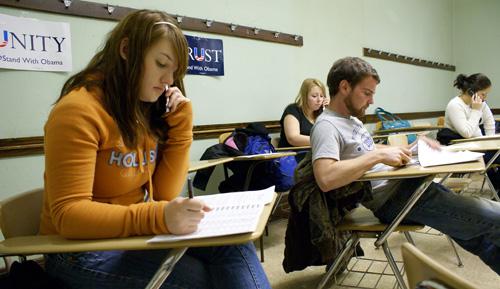The day in the life of UI student working on Obama’s campaign trail

Jan 24, 2008
Andrew Robinson, senior in LAS, will clutch two diplomas this spring, one in political science, the other in history.
The University coordinator of Illinois Students for Barack Obama helped write his own chapter of political history this winter during the Iowa Caucus.
Robinson described his responsibilities as a field organizer for Obama’s “Get Out the Caucus” effort.
As we near the Illinois primary on Super Tuesday, here is a behind-the-scenes look at the day to day life on the campaign trail.
9 a.m.
Get The Daily Illini in your inbox!
“I’d get to the office and grab a cup of coffee next door.”
Robinson worked out of the Story County office for Obama volunteers during the Iowa Caucus season.
Campaign staffers and volunteers set up camp in a conference complex within the city of Ames, Iowa.
Robinson and the crew of supporters brightened up their temporary office with some window art.
“I’m a big artist, so I drew a snowman with the Obama logo at the bottom, complete with snowflakes and some scenery,” Robinson said.
9:30 a.m.
“Time for a conference call with the entire staff in Iowa.”
Obama’s team carved Iowa into nine regions. Story County encompasses Iowa State University, the city of Ames, a few rural towns and plenty of farmland.
The central location of Ames made it ideal for conducting the regional organization of 23 voter precincts.
Robinson said he was in charge of a specific assignment: “The precinct Gilbert/Franklin Township was dedicated to me alone.”
10 a.m.
“The office is buzzing with volunteers getting ready to go out and canvass.”
Eight days of ‘Get Out the Caucus’ efforts had one momentous goal: contacting each precinct’s voters twice.
“In my entire [voting] universe there were supporters, ‘leaners’ who might be supporting us, undecideds and those we’ve had no previous contact with.”
Robinson and the cast of helpers he recruited organized their efforts to efficiently cover the precinct’s neighborhoods.
Maps were drawn up with walking patterns and household specifics.
11 a.m.
“Hop in my car and head into the precinct.”
“My precinct was pretty rural to me. It was a small town surrounded by cornfields, so you have to drive some country roads to get to it, but it was a town.”
Robinson marched through sub-zero gusts ringing doorbell after doorbell. He met both warm and frigid responses.
“I was bundled up in everything I had, but I was still freezing. My nose was running. I probably looked like a sad puppy coming to the doors,” he said.
With only a brief break to grab something to eat, Robinson’s afternoon canvassing stretched on for four to five hours until dusk.
5 p.m.
“Back to the office to start making phone calls.”
Voters who weren’t home to hear a knock on the door during the day’s canvassing heeded to the ring of their telephone in the evening.
“We were doing what we call ‘ID-ing’ supporters. Identifying which candidate they plan to support and whether or not they plan to go to the caucus,” Robinson said. “We’re also still doing some persuasion.”
Statistics and legislative issues were not Robinson’s telephone technique.
Instead he shared personal stories about what inspired his support of Sen. Obama, in the hope of influencing the voter on the other end of the line.
Calling plans for each night were tied to encouraging attendance at the candidate’s appearances in the state.
An hours worth of calling usually allowed for about 35 phone contacts, Robinson estimated.
9 p.m.
“Time for some data entry.”
Field organizers from all 23 precincts compiled the information collected after a day of canvassing and calling.
The volunteer matrix chart spanning the office walls would be carefully updated with the latest report on Obama’s universe of supporters.
“Eventually you can relax a little bit, maybe have a beer. It’s a long day and a lot of work, but you can’t complain because everyone there around you is busy doing the same thing,” he said.
By January 5, campaigning in the Story County office was complete. Success would be measured by the votes.
Attending the Caucus that night was a gratifying experience for Robinson.
“The coolest part was seeing people walk in who I’d talked to at the door,” he said. “They would say to me, ‘Thanks for having that conversation with me. You changed my mind. Now I’m going to caucus for Obama.'”
Robinson cheerfully slapped Obama stickers on such Iowans and pointed them in the direction of his candidate.





